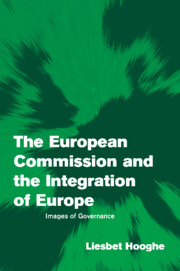Book contents
- Frontmatter
- Contents
- List of figures
- List of tables
- Preface
- Prologue
- 1 Preference formation in the European Commission
- 2 Men (and women) at Europe's helm
- 3 Images of Europe
- 4 Beyond supranational interest
- 5 Capitalism against capitalism
- 6 Principal or agent
- 7 Accommodating national diversity
- 8 Conclusion
- Appendix I Statistics
- Appendix II Description of independent variables
- Appendix III Survey material
- References
- Index
6 - Principal or agent
Published online by Cambridge University Press: 22 September 2009
- Frontmatter
- Contents
- List of figures
- List of tables
- Preface
- Prologue
- 1 Preference formation in the European Commission
- 2 Men (and women) at Europe's helm
- 3 Images of Europe
- 4 Beyond supranational interest
- 5 Capitalism against capitalism
- 6 Principal or agent
- 7 Accommodating national diversity
- 8 Conclusion
- Appendix I Statistics
- Appendix II Description of independent variables
- Appendix III Survey material
- References
- Index
Summary
Crisis in spring: Commission resigns en masse
“Et l'intendance suivra,” Napoleon said when going to war, meaning, roughly: “And the supply train will follow.” The masters of the European Union, in their common institutions and in national governments, have favoured a similarly lofty view of priorities in constructing their political and bureaucratic empire. When great campaigns for a single market or a single currency are going forward, they have tended to presume that matters of basic housekeeping can be left for later.
These words prefaced The Economist's biographical sketch of Mr. Erkki Liikanen, at the time the commissioner for budget, administration and personnel matters (The Economist, December 19, 1998, p. 66). Mr. Liikanen received praise in this article for his efforts to improve sound and efficient financial management. Yet, on March 15, 1999, he resigned with the entire Santer Commission after the publication of an independent expert report exposing six cases of fraud or mismanagement and several instances of nepotism in the Commission.
The unprecedented en masse resignation of the Commission was the climax of a six-month tug of war between Europe's executive and the European Parliament. It began, in the fall of 1998, with parliamentary inquiries into the Commission's financial management. Leaks from a disgruntled Commission official to the Green party fraction had triggered these. A parliamentary resolution of January 14, 1999, called for an official investigation by independent experts into alleged cases of fraud and mismanagement of Commission funds.
- Type
- Chapter
- Information
- The European Commission and the Integration of EuropeImages of Governance, pp. 142 - 167Publisher: Cambridge University PressPrint publication year: 2002



